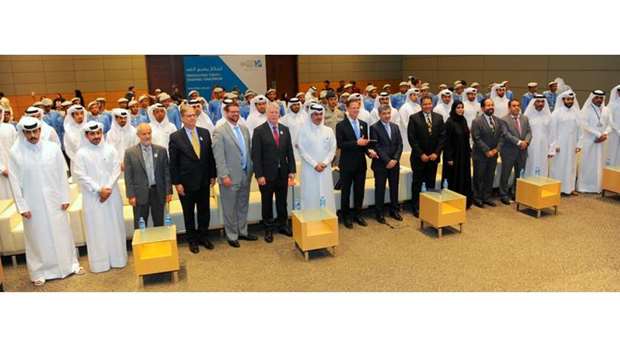“It is time to reinforce your efforts to assess what you can do collectively and independently,” he stressed, expressing confidence in Qatar’s ability to emerge out of the crisis stronger than ever and describing the resilience shown by Qataris as unlike that of any other nation.
Dr Martin was the main speaker at a public lecture titled “Education and the Blockade: Challenges and Opportunities” hosted by Hamad Bin Khalifa University (HBKU) in Education City on Thursday, which was attended by students, university representatives and senior SPU delegates.
The lecture focused on the evolving role of the education sector in light of the illegal blockade, highlighting the primary value of education in the advancement of societies, HBKU - a member of Qatar Foundation for Education, Science and Community Development (QF) - said in a statement.
“This call for lauding the power of education is in line with HBKU’s commitment to excellence and continuous capacity building efforts, by hosting renowned scholars and holding public lectures, and availing of new insights to public discourse, which supports the development of the nation, region and beyond,” the statement noted.
In his lecture, Martin commended QF’s and HBKU’s progressive mandate in providing first-grade education, emphasising the growing demand for higher education all around the world, and fuelling Qatar’s advancement.
He underscored the importance of identifying and working with students to understand the crisis not only in the region but also in different regions globally. “Be a force that can bring about change, think about the actions and activities that our students can do with legislators to extend their voice and influence in creating change,” he said.
About Qatar’s efforts in developing its human potential, he lauded the country and its leaders for investing heavily in education and supporting “the education for growth in young women as equal participants in society”.
Dr Martin commended Qatar for establishing Education City at Qatar Foundation, which brought world-class universities and educational programmes for the country.
“It is a wonderful opportunity to gather with academics from different parts of the world, share mutual interests, insights and common goals on the impact of education on our society. We will continue to strive towards cultivating a diverse academic environment for our young generation,” he stressed.
Among the challenges highlighted by him were disrupted alliances and partnerships, which he said inhibit higher education from being a place where innovative solutions can be developed. Other challenges include inadequate access to students.
He also spoke of numerous opportunities, including possibilities for enhanced partnerships on an international level, as well as promoting the use of technology to counter impaired access to education.
Dr Ahmad M Hasnah, president of HBKU, said: “The current political situation in the region is a topic of international interest; therefore, it is essential that educational institutions in Qatar explore the crisis through an analytical lens.
“By hosting informative lectures and seminars on the blockade, we are giving community members an opportunity to engage with leading experts on the topic, enabling them to understand the critical role of education and its importance in fostering a politically conscious society.”
The lecture was among a series of talks conducted at HBKU to promote a better understanding of the GCC crisis. These lectures are all open to the public.


